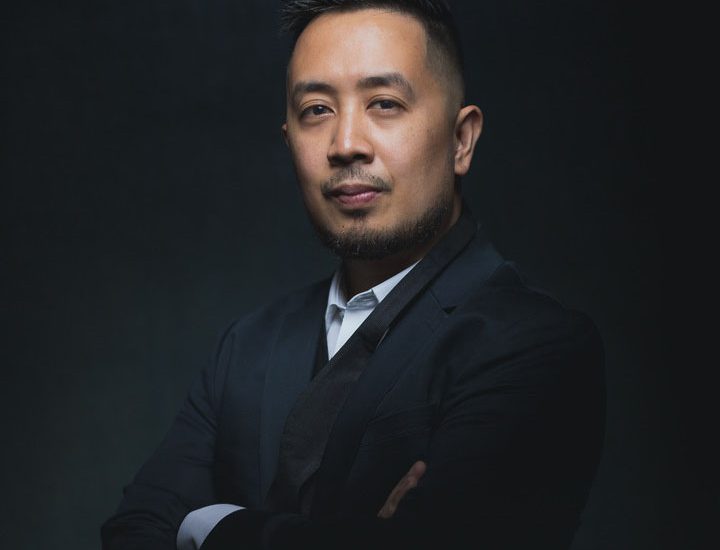By Theresa Standfast, Barbizon International
As a modeling and acting program that prepares young people for careers in the industry, not only is it essential to know how to create work in front of the camera, but also all the work that goes on behind it! And who better to share with us the inner workings of being a creator in the film industry than a filmmaker himself?
Meet creative storyteller, writer, and director, S. Roy Saringo. From starting out fresh with a film degree from Full Sail University where thereafter his first official film work for a zombie movie, The Human Trace, was left uncredited on IMDB, he’s gone on to adapt three best-selling novels into screenplays for the United Talent Agency in LA, An Imperfect Lens by Ann Roiphe, Utopia by Lincoln Child, and Kill Me by Stephen White.
Shooting numerous short films for a mix of corporate and small business clients, Roy is also currently a partner at production company Ethos Pictures in Beverly Hills. Roy is here to answer all our questions on his journey in filmmaking up until today, where he’s recently released his very own co-directed, shot, and produced film, Filtered!
What inspired you to start working in film? 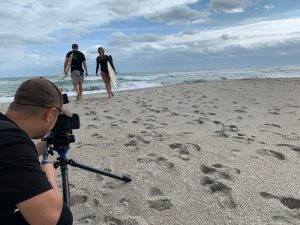
The moment I finished watching Pulp Fiction I knew I wanted to make films. There was something about the way Quentin Tarantino told that story that elevated the art of storytelling to me. It was different, it was fresh, and it had my attention.
What kinds of projects do you work on as a professional videographer and what kind of training does someone need to start working as a videographer?
Most of my current work is run-and-gun, simple setups, do-it-yourself kind of videography. (e.g. corporate videos; testimonials; wedding videos.) When I started at Full Sail University, I had no clue about anything that had to do with anything in film and video, so film school benefited me in that way, because it taught me from the ground up.
These days, YouTube will answer most questions you have about anything. I still search that site for answers I don’t know. My best advice is to do something hands-on either on your own or under someone willing to mentor you. It’s not uncommon to start with making coffee as a “gofer” and working your way up the ranks. The way I did it was bartering with a CrossFit gym to let me work out for free in exchange for weekly photos and videos to add to their social media sites. Plenty of companies love to barter. I still do it with my chiropractor. I also started as a volunteer at my church. Whether it’s a local church that has no media or one that has an established media team, both are beneficial in learning and gaining hands-on experience.
My church started with dinky handycams when I first volunteered, and I did everything from shooting to editing every video we made. It’s tough to do by yourself, but you learn quickly and you get better even quicker. Now my church rivals any live-television program out there, and I’m part of a larger team. There’s learning on every stage. Never stop learning.
From a director’s perspective, what is the benefit of working with an actor that has had training through Barbizon or some other acting training program?
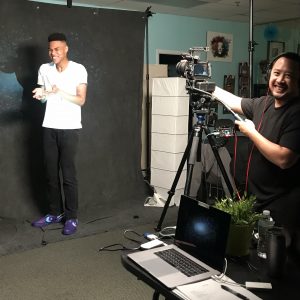 Training as an actor is important, because at the end of the day, acting is a job. Acting is work. You get out of it what you put into it. It’s show business, not show hobby. Hobby work gets hobby results. No director in any medium wants to work with someone who doesn’t take this business seriously. That’s why Barbizon is a great first step, because being a part of Barbizon lets professionals know you’re willing to put in work.
Training as an actor is important, because at the end of the day, acting is a job. Acting is work. You get out of it what you put into it. It’s show business, not show hobby. Hobby work gets hobby results. No director in any medium wants to work with someone who doesn’t take this business seriously. That’s why Barbizon is a great first step, because being a part of Barbizon lets professionals know you’re willing to put in work.
But Barbizon can’t make you into a great performer, it can only provide you with the tools and education to become one. But put in the work with the tools and knowledge you have, and you’ll make any director’s life easier. As they say, “a rising tide raises all ships.” The benefits of working with a competent performer elevates the project entirely, and that starts with training and taking it seriously. (Also… I’m probably going to choose to work with that competent performer again.)
As a Filipino-American who grew up in Queens, NY, how have you seen diversity play a role in and change within the film industry during your career?
As a film buff, I’m inspired by many movies, actors, and filmmakers just because excellent is excellent no matter what. On one hand, culture and heritage has nothing to do with why I love certain bodies of work. On the other hand, it’s always a low point to find a person or people on screen who share those sacred things about you misrepresented or under-represented.
 I remember watching Michael Bay’s The Rock and noticing a scene where Nic Cage is chased through a restaurant kitchen and a cook yells something in Tagalog, but the way he said it wasn’t authentic-sounding to the Filipino language. It’s like they had some random Asian man verbalize something written in the script. Or in the true story of Domino Harvey, a Ford-model-turned-bounty-hunter (portrayed by Keira Knightley), her fellow bounty hunting partner in real life is a Filipino-Hawaiian named “Choco,” but for the movie aptly named Domino, he was turned into a Hispanic man portrayed by a Venezuelan actor. It’s sad to think the real person wasn’t appealing enough that he had to be stripped of his ethnicity to something more “familiar.” It wasn’t too long ago that I was shocked to find Filipino actors portraying Filipino characters in shows like “Superstore” and “The Good Place.” And they were funny characters as opposed to being made fun of.
I remember watching Michael Bay’s The Rock and noticing a scene where Nic Cage is chased through a restaurant kitchen and a cook yells something in Tagalog, but the way he said it wasn’t authentic-sounding to the Filipino language. It’s like they had some random Asian man verbalize something written in the script. Or in the true story of Domino Harvey, a Ford-model-turned-bounty-hunter (portrayed by Keira Knightley), her fellow bounty hunting partner in real life is a Filipino-Hawaiian named “Choco,” but for the movie aptly named Domino, he was turned into a Hispanic man portrayed by a Venezuelan actor. It’s sad to think the real person wasn’t appealing enough that he had to be stripped of his ethnicity to something more “familiar.” It wasn’t too long ago that I was shocked to find Filipino actors portraying Filipino characters in shows like “Superstore” and “The Good Place.” And they were funny characters as opposed to being made fun of.
Now with the shift of more and more inclusion, it’s definitely an upward trajectory to know we’re being heard and seen a lot more in ways that better represent us. We still have a long way to go, but it’s a humbling feeling to be at this part of history where we get to be part of the change.
What advice do you have for someone looking to start a career in filmmaking?
My advice to anyone wanting to start a career in filmmaking is: DON’T DO IT. I’m kidding, but I’m also not. Make films because you don’t want to do anything else. Make films because you can’t see yourself doing anything else. Make films because you have to and because you need to. Wants change. Needs remain. I need to eat. I need to drink. I need to breathe. I need to make films. Want is not an option for any of the previous actions. And if you just want to, you won’t stick around through the ups-and-downs, and it’s a tough terrain ahead of you. The need will save you if must is the only option you have.
But for the ones who are all in: pick up a camera, find some friends, and film something. It’s never been easier than it is now. Make a short film. Submit it to film festivals. Get honest feedback. You can even make cheesy church videos or the hypest workout promos like I did. Just keep doing something behind a camera. Remember, it’s show business. Put in the work and take it seriously. Study the craft and make failure your best friend. The more you fail, the sooner you’ll win. Try, fail, adjust. Try, fail, adjust. Rinse, lather, repeat. It’s a part of success. Also… study the greats, watch their films, read their biographies. Study, study, study.
Do you have any funny or interesting on set stories?
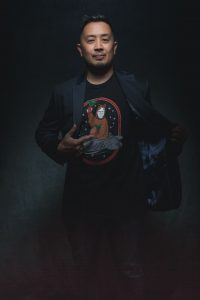 The funniest thing that’s happened to me on set wasn’t even on a set I was working on. During a visit to Chicago a few years back, I was walking around Grant Park downtown and texting a Chicago-native friend about where to buy authentic deep dishes and hot dogs. Because I was texting, I obviously wasn’t paying attention to my surroundings, so when I finally looked up, I immediately noticed actors Emmy Rossum and Dermot Mulroney walking towards me. So, without hesitation, I decided to approach them for a selfie. That’s when I heard, “CUT!” I looked around and realized I was on the set of Shameless – right in the middle of it. Lights, grip, and crew were everywhere looking at me.
The funniest thing that’s happened to me on set wasn’t even on a set I was working on. During a visit to Chicago a few years back, I was walking around Grant Park downtown and texting a Chicago-native friend about where to buy authentic deep dishes and hot dogs. Because I was texting, I obviously wasn’t paying attention to my surroundings, so when I finally looked up, I immediately noticed actors Emmy Rossum and Dermot Mulroney walking towards me. So, without hesitation, I decided to approach them for a selfie. That’s when I heard, “CUT!” I looked around and realized I was on the set of Shameless – right in the middle of it. Lights, grip, and crew were everywhere looking at me.
They must’ve thought I was a park extra, because I was doing what the park extras were doing: walking the park and acting normal, until I “broke character.” A P.A. ran up to me and escorted me off. The funny part was before we walked away, I had the nerve to still ask for the selfie, and the actors were so confused with what was happening – I think they would’ve done it. The P.A. looked around, probably saw his A.D., and said, “Sorry, you have to leave.” I never did get that selfie. But to my defense: when was the next time I’d have an opportunity to take a selfie with both Emmy and Dermot together on the set of Shameless?
Congratulations on your recently released film Filtered. What inspired you to create and direct your own film?
 Filtered came to me when I was ready to quit pursuing film and take on an unrelated corporate job. A trusted friend of mine had a heart-to-heart and said what I should’ve told myself in the first place… that she couldn’t see me doing anything else but making films. And being that I wasn’t making any films or had plans to, I took the risk of not taking the job in Corporate America to wait for an opportunity that wasn’t anywhere on the horizon.
Filtered came to me when I was ready to quit pursuing film and take on an unrelated corporate job. A trusted friend of mine had a heart-to-heart and said what I should’ve told myself in the first place… that she couldn’t see me doing anything else but making films. And being that I wasn’t making any films or had plans to, I took the risk of not taking the job in Corporate America to wait for an opportunity that wasn’t anywhere on the horizon.
Until, that is, a week later another friend invited me to watch her kids perform a stage musical at a small church in Safety Harbor, Florida. She said I had to meet the local writer/director (Katie Combs) who had written all original music and lyrics for this musical… performed by all kids… at a small church… in a small suburban town. None of which was compelling me to go other than being respectful towards a friend who was proud to share their kids’ accomplishments with me.
So, I went, and I was so confused, because none of the things aforementioned became a cause of cringe. As a matter of fact, these kids’ musical held at a small church in a small suburban town written by a nobody I’ve never heard of was actually remarkable. So much so, I asked to have coffee with Katie the next day. I asked why her kids lacked cringe. From their solos and harmony to their stage presence and presentation, they were remarkable. Everyone knew their lines. No one had stage fright or nervous jitters.
She told me her method of teaching, and it was very much on my wavelength. I just didn’t know anyone personally who approached directing the same way. So, we happily decided to make it a goal to work together. Katie invited me to watch and consider a musical her high school-aged students were workshopping that was created specifically for them to perform. It was the same story. I sat in the audience going, “What is going on? Why is this so good? Who is this Katie Combs?” It would eventually go on to win “Best Musical” at the Tampa Theatre Festival.
What is Filtered about and where can people watch it?
Filtered is a powerful, poignant, honest look at social media told by the teenagers who live it. I thought, “Ten characters, bedrooms, classrooms, cafeteria… How hard could it be to shoot? Everyone already knows their lines. It’s basically the same script just adapted to film. We just have to find locations, film it, go to a recording studio and record songs and mix it. We can finish it in a couple months.”
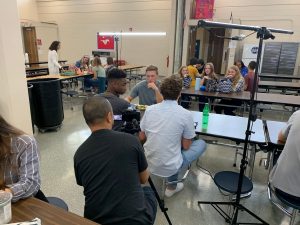 So, after the workshop finished Katie and I agreed to make Filtered our first project together. It became more than that, Filtered is our first feature film ever. With no experience, no money, no crew – all we had was the audacity to believe we can do it. So, we did it. We did everything a full crew would do, just by ourselves. Me, Katie, and eventually Joe Cosas with everything post-production audio-related. He, too, never worked on a feature film. Phone calls to industry friends and YouTube were common.
So, after the workshop finished Katie and I agreed to make Filtered our first project together. It became more than that, Filtered is our first feature film ever. With no experience, no money, no crew – all we had was the audacity to believe we can do it. So, we did it. We did everything a full crew would do, just by ourselves. Me, Katie, and eventually Joe Cosas with everything post-production audio-related. He, too, never worked on a feature film. Phone calls to industry friends and YouTube were common.
So, the fact that we won “Best Film” at the Tampa Bay Motion Picture Industry Professionals Film Festival and now getting programmed at the Sunscreen Film Festival can only attest to the power of “just doing it” even in the face of inexperience and small budgets. With the pandemic and lockdown, it took us a little over a year to complete, but we did it, and we did it ourselves.
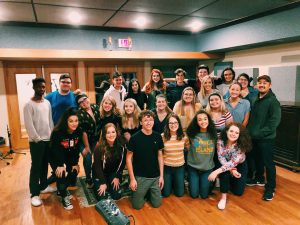 If you’re in the Tampa Bay area and Sunscreen Film Festival hasn’t occurred yet, find tickets to our screening at their website: sunscreenfilmfestival.com. Come find me, say hello, and don’t forget to mention you’re in the Barbizon family. If the festival is done with, we’re hoping to work with a distributor to get our film into your homes via a streaming service. Other than that, we’re hoping to get programmed into other festivals this year. Fingers-crossed that one will be near you.
If you’re in the Tampa Bay area and Sunscreen Film Festival hasn’t occurred yet, find tickets to our screening at their website: sunscreenfilmfestival.com. Come find me, say hello, and don’t forget to mention you’re in the Barbizon family. If the festival is done with, we’re hoping to work with a distributor to get our film into your homes via a streaming service. Other than that, we’re hoping to get programmed into other festivals this year. Fingers-crossed that one will be near you.

